Henry County Public Safety Communications serves the citizens of Henry County, Indiana.
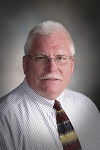
Butch Baker,
911 Director
Henry County Emergency Services E-911
Henry County Justice Center, Suite 10
1215 Race Street
New Castle, Indiana 47362
bbaker@henrycounty.in.gov
911 History
Prior to 1991, basic 911 service existed only in the New Castle area, in primarily Henry Township. The remaining areas in Henry County had no 911 service. Basic 911 would allow the caller to reach the New Castle Police Department by dialing 911 but no data, like caller information, and or location would appear in the dispatch area. During this time, representatives from both the City of New Castle and Henry County Government embarked on a 3-year campaign to obtain Enhanced 911 for the entire County.
In September of 1991, a single PSAP Enhanced 911 center was opened and Enhanced 911 service was implemented for all Henry County Citizens. During the 3-year 911 campaign, discussions took place between city and county government officials to combine dispatch duties and responsibilities to provide a more cost effective and efficient service.
The single PSAP joint dispatch center was housed at the New Castle Police Department for the first 12 years. The 911 Center dispatches for the New Castle Police & Fire Department, as well as the New Castle-Henry County EMS. The 911 Center also dispatches for the Henry County Sheriff’s Office, Four Town Marshals and 15 Township Fire Departments.
In 2003 the single PSAP joint Dispatch Center was moved to the basement of the newly constructed Henry County Justice Center. The move included an upgrade to all the equipment in the 911 center. At the time of its opening, the dispatch center at the Justice Center was phase 3 compliant with state-of-the-art technology.
Over the past 911 technology advances have taken place within this industry which will need to be addressed in the near future.
Staff & Duties
Located in New Castle, Henry County Public Safety Communications Henry County Emergency Services 911 dispatches for 3 police departments, the Henry County Sheriff's Office, 6 Town Marshals, the New Castle Fire Department and 15 Township fire and 3 EMS agencies. The Center is staffed with 9 full time and 15 parttime professional telecommunicators, along with an IT department.
Jurisdiction
Henry County is located in the East Central l part of Indiana just East of Indianapolis. With a coverage area of 222 square miles and a population of nearly 49,000, our center received phone calls and dispatched Emergency service personal law, fire and EMS issues. The County Seat is New Castle.
Text to 9-1-1
In June, 2017 Henry County began accepting inbound text messages to 9-1-1. Outbound texting had started earlier the same year. With the outbound text capabilities, we are able to text the number and have been successful in getting an answer nearly 100% of the time. With inbound texting, we are able to connect with the deaf and hard-of-hearing community. In addition, we have received texts from callers that could not speak due to the situation they were in.
Continuing Education
Communications staff receives hours of continuing education each year to maintain the highest level of professional ability. All dispatchers receive approximal 60 hours of Inservice training and receive APCO certification in Public Safety Telecommunicator, Emergency Medical and Law and Fire Dispatching.
Vision Statement
We will hold ourselves accountable to the highest level of honesty and ethical conduct, dedicating our operation to serve the community and emergency service personnel of Henry County in a courteous, respectful, and professional manner. We seek continuous advancement in our personal skills to ensure that we will always provide capable and professional law enforcement services without partiality or discrimination.
Mission Statement
The mission of Henry County Emergency Services 911 Central Dispatch Center is to provide professional, efficient, effective, communication to safeguard the lives and property of the residents, visitors, and all emergency service personnel within our community.
The mission shall be conducted and accomplished by operating a state of the art, combined police, fire, and EMS emergency communications center which serves to receive emergency calls to 9-1-1 and dispatch the appropriate agencies to provide assistance.
Spillman Computer Aided Dispatch (CAD)
Our Communications Center operates on Spillman CAD, which features:
o Automatic Vehicle Locator GPS on all police, fire and EMS vehicles
o Mapping Integration
o Business and Alarm Subsystems
o Unit recommendation so that the closest units can be dispatched
o Premise alert data to alert responding units to danger or environmental information
o Statistical Reporting so that Police and Fire Administration can track and keep up to date on calls for service
VESTA Pallas Phone System
VESTA is a PBX based digital phone system. It features:
o 911 and administrative line capabilities
o Compatibility with our CAD mapping system
o FCC wireless Phase I and Phase II compliant
o Automatic location identification (ALI) rebid to update wireless callers location data
o VoIP compatible ANI/ALI
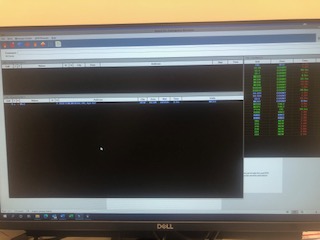
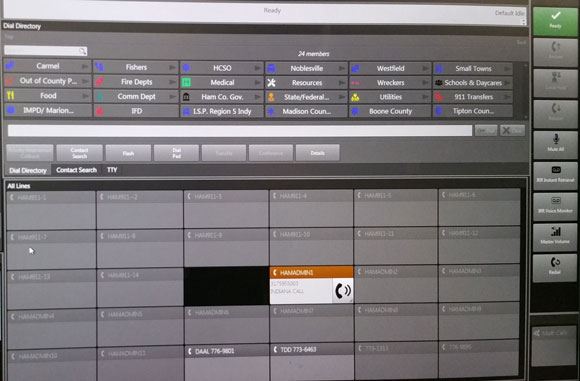
Motorola Astro 25 Digital P25 Trunking Radio System
o Provides both trunked and conventional digital radio dispatch
o 800MHz and VHF compatible
o Digital playback of radio traffic
o Multiple customizable screens
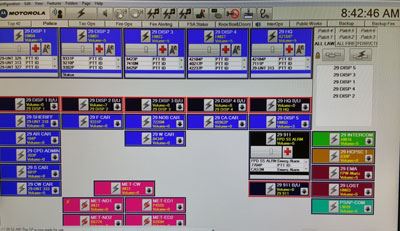
Program Details
We use this structured program to quickly and efficiently gather critical information required for every call, including: address, callback number, caller name, and chief complaint. Drop-down answer choices make it quick and easy to navigate through the key questions that determine the response needed for the call. Links make it easy for call-takers to quickly give pre-arrival instructions appropriate for the case.
Agencies served by Henry County 911 Dispatch
| Law Enforcement |
|
| Henry County Sheriff |
(765) 529-4901 |
| New Castle Police |
(765) 529-4890 |
| Knightstown Police |
(765) 345-2785 |
| Middletown Police |
(765) 354-2281 |
| |
|
| Kennard Town Marshal |
|
| Cadiz Town Marshal |
|
| Sulphur Springs Town Marshal |
|
| Mt Summit Town Marshal |
|
| Mooreland Town Marshal |
|
| Lewisville Town Marshal |
|
| |
|
| |
|
| Fire Departments |
|
| New Castle Fire Department |
(765) 521-6815 |
| Knightstown Fire Department |
(765) 345-2121 |
| Middletown Fire Department |
(765) 354-2268 |
| Mt Summit / Prairie Twp Fire Dept |
|
| Mooreland / Blue River Twp Fire Dept |
|
| New Lisbon Fire Dept |
|
| Sulphur Springs / Jefferson Twp Fire Dept |
|
| Millville / Liberty Twp Fire Dept |
|
| Straughn Fire Dept |
|
| Shirley Fire Dept |
|
| Lewisville / Franklin Twp Fire Dept |
|
| Cadiz / Harrison Twp Fire Dept |
|
| Greensboro Fire Dept |
|
| Blountsville / Stoney Creek Fire Dept |
|
| Dunreith Fire Dept |
|
| Kennard Fire Dept |
|
| Spiceland Fire Dept |
|
| |
|
| EMS Departments |
|
| New Castle - Henry County EMS |
(765) 521-6860 |
| Henry County EMS (Sheriff Ambulance) |
(765) 545-0330 |
| Knighstown EMS |
|
| Middletown EMS |
|
Guide to 911
Most of us take for granted that someone else will be there on the other end of the phone, ready to help at a moment's notice. The Henry County Public Safety Communications Center is staffed 24 hours a day, 7 days a week, 365 days a year. As simple as it may seem, the system of 911 is very sophisticated. Let's take a look at what happens when you call. When you dial into 911:
o The signal goes to the phone company's database.
o There, it finds out the information that you supply the phone company when you start your service.
o Then your signal, along with the information is sent to us in the form of Automatic Name and Location Information (ANI/ALI).
This process occurs very quickly, in a matter of seconds, but you may hear some clicking on the phone while this is taking place. When you dial 911 please stay on the line, do not hang up!
Emergency Call Procedure
The Telecommunicator answering your 911 call determines the type of service needed using a proven and efficient interview process. They provide initial help if necessary and then dispatch the appropriate emergency agency for assistance.
Medical Emergencies
The Telecommunicator is the first link in the medical Survival Chain, providing Pre-Arrival and Post-Dispatch instructions to callers with a medical emergency. Critical procedures such as CPR, airway management, and childbirth, just to name a few, can be started before more advanced help arrives.
Phone Number Information
When you call 911 from your wired home phone, a computerized database maintained by your phone company will provide your name, telephone number, and your address. However, that information may not be correct if you have recently moved or changed phone numbers. Therefore, the Telecommunicator will need to verify your address and phone number.
Businesses
If the phone is from a business, the database will indicate the business name, telephone number of the business, and the address of the business. However, that information may not be correct if the business you are calling from has more than one location. The phone company will show the address and telephone number of the main building. Therefore, the Telecommunicator will need to verify your address and phone number.
Cell Phones
If you are calling from a cellular phone, the database will provide your cellular phone number and the address of the cell site you contacted. If you have a cellular phone that is reasonably new, the database will also provide coordinates of your location, and we will be able to find you within a few yards if you remain at the same location. However, this sometimes can take up to one minute for the database to give us that information. Therefore, the Telecommunicator will need to verify your location and phone number.
Address & Other Information
To verify your address, location and phone number, the Telecommunicator will verify where you need the assistance. You could be calling from your home about an incident up the street or for your next-door neighbor. If you can't give us the address, you may be asked for directions or a description of the location. Some other questions you will be asked are:
o Where
o What
o When
o Who
o Why
o Are there any weapons
We may ask other questions to gather specific details about the location, suspects, or victims.
Who, What & Where
Just as soon as we get the answers to where and what, the Telecommunicator can enter the call in the computer-aided dispatch (CAD) system and dispatch the appropriate public safety personnel to your call. After the Telecommunicator has dispatched the public safety personnel, then comes who. Do you know the person? You will need to describe the person. Describing a person is not as easy as it sounds; however, the Telecommunicator can guide you through this process. All additional information will be relayed to the public safety personnel.
Please Remember
Answering questions does not necessarily delay the dispatch of assistance. A dispatcher is sending help your way while the Call Taker takes additional information from you. The more pertinent information you give us, the safer everyone will be. If you are a little excited or in a panic when you call, it's OK. Just take a deep breath and try to calm down. The Telecommunicators can assist you. We need you to be our eyes and ears.
Wireless 911 Services
Background
The number of 911 calls placed by people using wireless phones has significantly increased in recent years. It is estimated that about 70% of 911 calls are placed from wireless phones, and that percentage is growing.
For many Americans, the ability to call 911 for help in an emergency is one of the main reasons they own a wireless phone. Other wireless 911 calls come from Good Samaritans reporting traffic accidents, crimes or other emergencies. The prompt delivery of wireless 911 calls to public safety organizations benefits the public by promoting safety of life and property.
Unique Challenges Posed by Wireless Phones
While wireless phones can be an important public safety tool, they also create unique challenges for emergency response personnel and wireless service providers. Since wireless phones are mobile, they are not associated with 1 fixed location or address. While the location of the cell site closest to the 911 caller may provide a general indication of the caller's location, that information is not usually specific enough for rescue personnel to deliver assistance to the caller quickly.
The FCC's Wireless 911 Rules
The Federal Communications Commission (FCC) has adopted rules aimed at improving the reliability of wireless 911 services and the accuracy of the location information transmitted with a wireless 911 call as part of our efforts to improve public safety. Such improvements enable emergency response personnel to ensure that Public Safety Answering Points (PSAPs) receive meaningful, accurate location information from wireless 911 callers in order to dispatch local emergency responders to the correct location and to provide assistance to 911 callers more quickly.
The FCC's wireless 911 rules apply to all wireless licensees, broadband Personal Communications Service (PCS) licensees, and certain Specialized Mobile Radio (SMR) licensees. Mobile Satellite Service (MSS) providers, however, are currently excluded.
The FCC's basic 911 rules require wireless service providers to transmit all 911 calls to a PSAP, regardless of whether the caller subscribes to the provider's service or not.
Phase I
Phase I Enhanced 911 (E911) rules require wireless service providers to provide the PSAP with the telephone number of the originator of a wireless 911 call and the location of the cell site or base station transmitting the call.
Phase II
Phase II E911 rules require wireless service providers to provide more precise location information to PSAPs; specifically, the latitude and longitude of the caller. This information must be accurate to within 50 to 300 meters depending upon the type of location technology used.
Location Transmission
The FCC recently required wireless carriers to provide more precise location information to PSAPs. As a result, wireless carriers will be required to comply with the FCC's location accuracy rules at either a county-based or PSAP-based geographic level. The new standards apply to outdoor measurements only, as indoor use poses unique obstacles.
Filing a Complaint with the FCC
If you have a problem completing a 911 call from your wireless phone, first try to resolve the problem with your service provider. If you cannot resolve it directly, or if you think your wireless service provider is not complying with the FCC's wireless 911 requirements, you can file a complaint with the FCC. There is no charge for filing a complaint. You can file your complaint using an online complaint form. You can also file your complaint with the FCC's Consumer Center by calling 1-888-CALL-FCC (1-888-225-5322) voice or 1-888-TELL-FCC (1-888-835-5322) TTY; faxing 1-866-418-0232; or writing to:
Federal Communications Commission
Consumer and Governmental Affairs Bureau
Consumer Inquiries and Complaints Division
445 12th Street, Southwest
Washington, D.C. 20554
What to Include in Your Complaint
When you open the online complaint form, you will be asked a series of questions that will take you to the particular section of the form you need to complete. If you do not use the online complaint form, your complaint, at a minimum, should indicate:
o Your name, address, email address and phone number where you can be reached;
o The name of the company that you're complaining about; telephone number involved, account number, date of incident and description of the problem.
For More Information
For more information about the FCC's wireless 911 rules, visit the FCC's wireless 911 website. For information about other telecommunications issues, visit the FCC's Consumer and Governmental Affairs Bureau website, or contact the FCC's Consumer Center using the information provided for filing a complaint. You can also read through the Wireless 911 Services Guide (PDF).
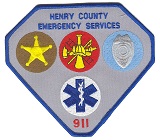
Questions
1.Who answers 911 calls?
Professionally trained dispatchers from Henry County answer all 911 calls whether it is a wired or cellular telephone. Should the call require contact with another agency, we will transfer your call to the proper agency. If you are on or near the border with another county there is a chance your call will be answered by another agency. Please explain your location and you will be transferred to us.
2.What should I do if I accidentally call 911?
Do not hang up. Allow the dispatcher to answer and explain that it was an accidental call. We are obligated to call back and confirm there was no emergency. If we are unable to contact the caller, but have an accurate location, law enforcement will respond.
3.When should I call 911?
There are many good reasons to use 911: for emergencies; you are unsure about your location; you do not know the non-emergency number; or you are in doubt if an incident is an emergency.
4.What type of information should I give to 911?
Every call is different. Simply follow the questions the dispatcher asks. Be ready to provide: where you are; what happened; who is involved; and how and why it happened. Other specific questions could be asked such as weapons involved, vehicles involved and direction of travel, if they left the scene, descriptions of people involved, etc. The most important thing in these situations is to remain calm and clear to the dispatcher so he or she can send you the help you need.
5.If I call 911 on a cellular telephone, will I be found?
Most cellular telephones made after 2006 have GPS locating technology built into them. If conditions are good, we will get a location within a few yards of your location. Being indoors, in a densely forested area, or on the edge of a reception area will affect accuracy of the locating system.
6.If it is not an emergency, should I call 911?
If you need law enforcement, fire or EMS, call 911. If you are calling for administrative staff or follow-up to an emergency call, you should use the non-emergency number- 765-529-4901.
7.Can I talk to the Police Chief or Sheriff if I call 911?
No, you must use the non-emergency numbers to contact any administrative staff.
8.If someone is knocking on my door asking to call the police, must I let them in?
If you feel there could be imminent danger to yourself, you should not allow the person in, but call 911 immediately and let us know what is occurring. If you do provide shelter to someone while waiting for emergency services, be sure to let the dispatcher know where the incident is occurring and where we can find the victim.
9.Is it true that I can call 911 from any disconnected wireless telephone?
For most providers, that is true. We recommends that you do not give old phones to children as toys. If the batteries are charged, the phone will call 911 if it receives a signal the phone company does not recognize. If we can not get verbal confirmation there is not a problem and we do get a valid location on the phone, we will send law enforcement.
10.I have called. Where is the officer?
All calls for law enforcement service are prioritized based on the information provided by the caller. Officers are sent as soon as possible, and generally there is very little delay between the receipt of a call and the dispatching of an officer.
Sometimes, usually due to heavy volume or extreme weather, calls will be prioritized based on the following criteria: "in progress" threat of injury or to life; "in progress" threat to property; threats to life or property that have not occurred; incidents that have occurred but there are no suspects in the area; and other incidents.
11.Will the dispatcher help in medical situations?
Yes, Indiana Law (IC 16-31-3.5-3) requires all Emergency Medical Dispatchers to be certified. Henry County dispatchers are trained to provide appropriate pre-arrival instructions to assist in lifesaving efforts prior to the arrival of first responders.
12.I am not happy with the service I received on the phone, what can I do?
The staff of the Communications Center attempts to deal with every call in a courteous manner. Due to the nature of emergency situations, our staff attempts to get the information required to locate you and determine the proper response in as short a time as possible. Some emergencies do require a more assertive approach to gain the information. If you feel that your call was not handled appropriately, you may contact the Director of Operations at 317-776-4321.
13.Can I call 911 if I'm hearing impaired?
Yes, our Communications Center is equipped with TDD/TTY equipment. Communications professionals receive extensive training in handling emergency situations utilizing this special equipment.
14.Can someone call 911 who does not speak English?
Yes, our Communications Center subscribes to a telephone translation service providing access to interpreters who speak more than 170 languages and are available 24 hours a day, 7 days a week, for emergency communications services with non-English speaking callers.